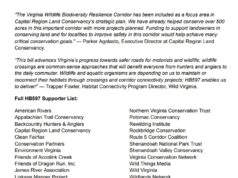( – promoted by lowkell)
 Virginia Attorney General Mark Herring issued an official advisory opinion on May 5 holding that Virginia localities have the right to prohibit hydraulic fracturing (or “fracking”) as part of their power to regulate land use within their boundaries. The letter reverses a two-year-old opinion by former Attorney General Ken Cuccinelli.
Virginia Attorney General Mark Herring issued an official advisory opinion on May 5 holding that Virginia localities have the right to prohibit hydraulic fracturing (or “fracking”) as part of their power to regulate land use within their boundaries. The letter reverses a two-year-old opinion by former Attorney General Ken Cuccinelli.
Herring’s opinion cites §15.2-2280 of the Virginia Code, which grants broad zoning powers to localities. These include the power to “regulate, restrict, permit, prohibit, and determine” land uses, such as “the excavation or mining of soil or other natural resources.” Thus, writes Herring, “I conclude that the General Assembly has authorized localities to pass zoning ordinances prohibiting fracking. The plain language of the stature also authorizes localities to regulate fracking in instances where it is permitted.”
The letter is not available online as of this writing, but is expected to be posted on the Official Opinions page.
Herring’s opinion comes in a letter to Senator Richard Stuart, who had asked whether Virginia law allows localities to prohibit “unconventional gas and oil drilling,” commonly known as fracking, and whether they may use their zoning authority “to regulate aspects of fracking, such as the timing of drilling operations, traffic, or noise.”
The letter overrules a January 11, 2013 opinion by then-Attorney General Ken Cuccinelli, which held that the General Assembly had preempted localities’ right to regulate or ban drilling when it passed the Virginia Gas and Oil Act. Under §45.1-361.5, localities may not “impose any condition, or require any other local license, permit, fee, or bond to perform any gas, oil or geophysical operations which varies from or is in addition to the requirements of this chapter.”
But, Herring notes, the statute “also includes a savings clause stating that the Act does not ‘limit or supersede the jurisdiction and requirements of . . . local land-use ordinances.'” Thus, it explicitly preserves local zoning authority to prohibit or limit fracking.
Herring concludes, “To the extent that the 2013 Opinion conflicts with this conclusion, it is overruled.”
Interestingly, if localities choose to restrict fracking but not prohibit it, they may actually leave themselves more open to challenge. Herring’s opinion reaffirms that portion of Cuccinelli’s opinion that upheld the right of localities to impose some restrictions on fracking, short of outright prohibition. However, the restriction must be “reasonable in scope” and “not inconsistent with the Act or regulations properly enacted pursuant to the Act.” As a result, a fracking company might have a better shot at challenging a restriction than it would an outright ban.
Herring adds, “Determining the extent to which particular zoning restrictions on fracking may possibly be preempted by state law will be governed by the particular facts, restrictions, and regulations at issue. Consequently, I can express no opinion on whether any particular zoning restriction has been preempted.”




![[UPDATED 1/29/26] Audio: Sen. Tim Kaine Talks to Blue Virginia About His “Five-Point Plan” to Fight Trump’s Orban-Like Assault on US Democracy; Civil Disobedience a la MLK Jr.; Trump’s Bogus “Energy Emergency”; the Crucial Importance of the 2025 VA Elections; etc.](https://bluevirginia.us/wp-content/uploads/2025/02/kaineinterview2-238x178.jpg)







